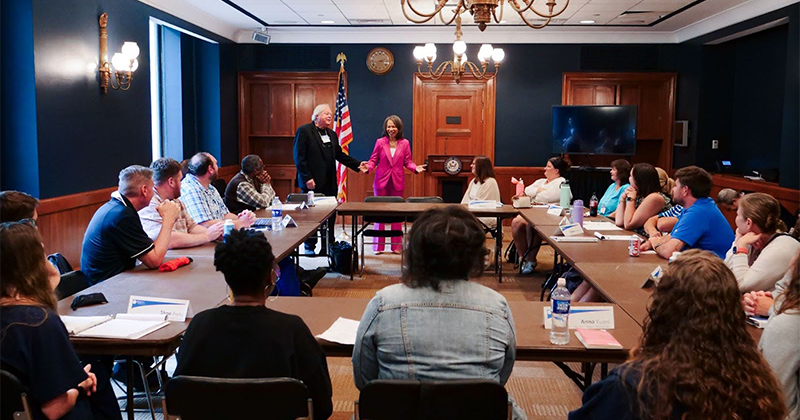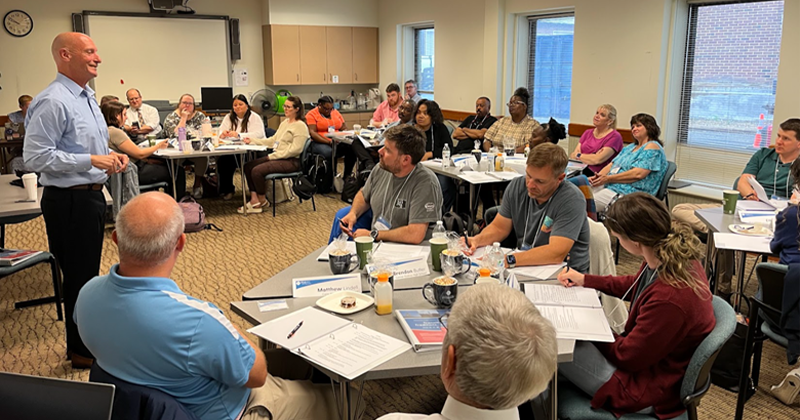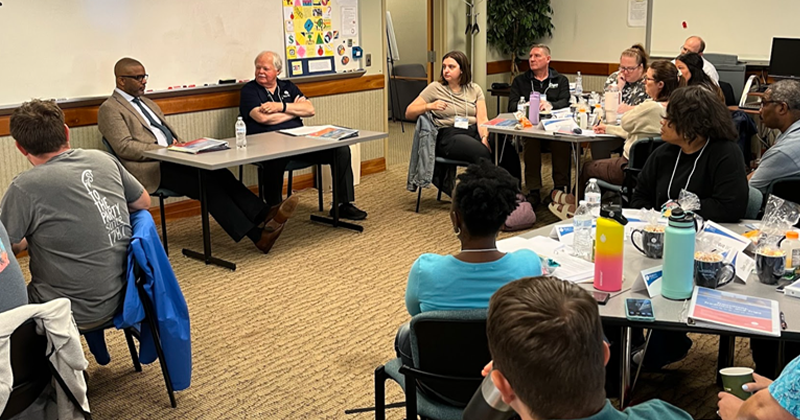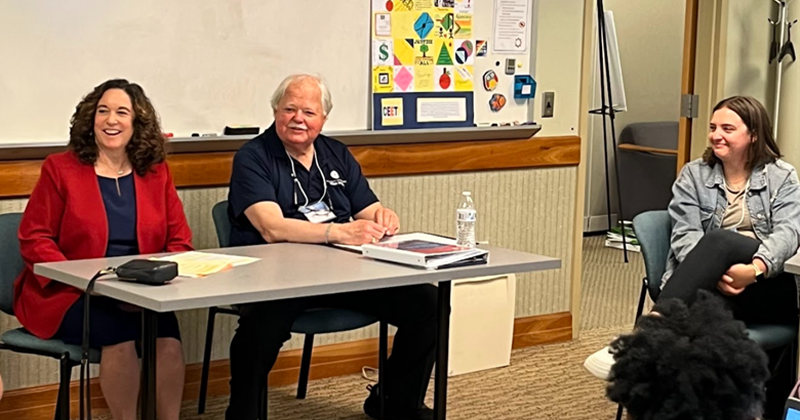
Category: IPA

The Democracy Project Celebrates Its 25th Anniversary
July 28, 2025 Written by Biden School Staff | Photo by Biden School Staff
On June 16, 2025, twenty-three social studies teachers from across Delaware gathered at the University of Delaware (UD) for the 2025 Democracy Project Summer Institute. This intensive week-long program is organized by the Delaware Center for Civics Education (DCCE) at UD’s Institute for Public Administration (IPA).
The Democracy Project, now in its 25th year, is led by Fran O’Malley, DCCE director; Ed Freel, IPA senior fellow; and Scott Abbott, DCCE assistant director. Grades K–12 educators attended sessions with elected officials, traveling to historical hubs including Dover, Washington, D.C., and Philadelphia.
In preparation for the 250th anniversary of signing the Declaration of Independence in 2026, this year’s theme, “Traditions, Transitions, and Trips,” focused on honoring the founding traditions of American democracy and addressing the modern-day transitions in government at all levels. Teachers developed strategies to encourage active student citizenship throughout the week and learned more about regional policies.

The week began on the University of Delaware’s Newark campus, where educators heard from leaders such as Chief Justice Collins J. Seitz, Jr. of the Delaware Supreme Court, former Delaware Secretary of State Jeffrey Bullock, and current Delaware Secretary of State Charuni Patibanda-Sanchez, who offered insights into how recent leadership transitions have affected Delaware’s judiciary and executive branches.
When responding to the anonymous program survey, one participant noted, "It was great to see and speak with and question our representatives at every level of government. The access we had made the seminar feel special. To see the state, local and federal levels as well as executive, legislative, and judicial branches really helped to put a face with who our government is and how they all try to serve the best interests of our state and country.”

New Castle County Executive Marcus Henry and City of Wilmington Mayor John Carney spoke to the evolving demands of local government. Mayor Carney shared the interesting perspective of moving from chief executive of the state as Delaware’s previous governor to chief executive of Delaware’s largest city. Delaware Secretary of Education Cynthia Marten shared the Department’s vision for education and civic learning across the state.
These sessions laid the groundwork for rich conversations about how teachers can engage students in understanding the mechanics and the human dimension of government.
The institute’s location changed throughout the week, with each day offering immersive, place-based learning opportunities. On Tuesday, the cohort traveled to Washington, D.C., for a series of high-level conversations with policy experts and elected officials.
In the Rayburn House Office Building and Dirksen Senate Office Building, teachers met with U.S. Senators Chris Coons and Lisa Blunt Rochester, who discussed the legislative process, constituent engagement, and the unique role Delaware plays on the national stage. Conversations with media experts like The Washington Post’s Paul Kane and NPR’s Domenico Montanaro, both alumni of the University of Delaware, helped educators better understand the relationship between the press and government during the fast-paced news cycles of recent months and years.

The following day in Dover, the group met with Delaware State Senator Russ Huxtable, who represents the 6th District, including Milton, Lewes, Rehoboth Beach, and Dewey Beach, and State Representative Michael Smith, who represents the 22nd District, including Pike Creek, Hockessin, and Newark. Budget officials, lobbyists, and leaders from the Delaware Public Archives provided their perspectives on government and policy transitions. These sessions gave teachers a clearer picture of how the state government functions and how policies are shaped, funded, and implemented.
Another participating teacher reflected in the survey, "Connecting with local, state, and federal legislators was the highlight of the week for me. It provided an inside look on Delaware politics that I hope continues with future programs. Also, the trips were a welcome addition that provided context and understanding to the content of the week."
In anticipation of the semi-sesquicentennial of the Declaration of Independence, DCCE has partnered with the American Historical Association through a Library of Congress Teaching with Primary Sources (TPS) grant to develop a series of model lessons on the Declaration and its legacy. Teachers attending the Democracy Project had early access to sample lessons, with sessions led by Fran O’Malley and Scott Abbott of the DCCE during the week.
The week concluded with a field study in Philadelphia, where educators toured the Museum of the American Revolution and the National Constitution Center and took a walking tour of historic sites around Independence Mall. This trip grounded abstract ideals in physical spaces, reinforcing the enduring relevance of 1776.
Unlike conventional professional development workshops, the Democracy Project gives teachers direct access to policymakers and elected officials. Participants not only learn about government systems, they learn from the very people who operate within them. Ed Freel played a critical role in coordinating the speakers given his long history of public service, including an 8-year tenure as Delaware’s Secretary of State during the two terms of Governor Tom Carper.
The impact of the Democracy Project extends well beyond a single week. Participants leave with new resources, new ideas, and a renewed sense of purpose in teaching civics. Many go on to build sustained partnerships with elected officials who speak in their classrooms or support student civic action projects.
As Delaware and the nation prepare to commemorate 250 years of democracy, initiatives like the Democracy Project ensure that the next generation understands not just what democracy is, but how to participate in it. Through deep learning, direct engagement, and professional collaboration, these educators are better equipped than ever to prepare their students for informed and active citizenship.
For more information about the Delaware Center for Civics Education and its programs, visit www.ipa.udel.edu/civics.
